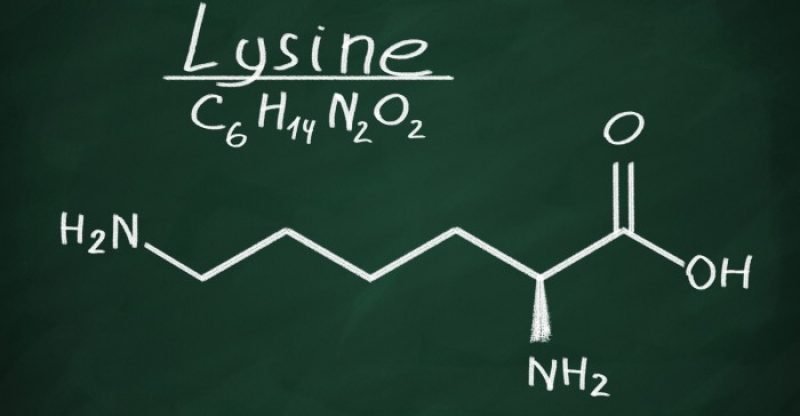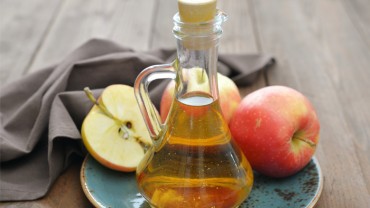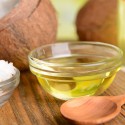13 Evidence-Based Benefits of Lysine
What is Lysine?
Did you know that the same protein used to get rid of cold sores is also being used to fight cancer?
This essential amino acid is known as L-lysine, l lysine, or just lysine.
For decades now, people have known of lysine as a way to treat herpes virus, as it is one of the main ingredients in cold sore ointments.
However, lysine has been proven to help treat other issues like diabetes, anxiety, and cancer.
L lysine is an amino acid that works as a building block protein that is necessary for cell creation and growth.
There are 20 necessary proteins like lysine, but only 10 of them can be created in the human body.
Lysine is an amino acid that occurs naturally and can be ingested through certain food and supplements (2).
Most essential amino acids are called stereoisomers, which means that they exist in two types that mirror one another.
There are both L- and D- forms of essential amino acids.
L-form amino acids are used in protein synthesis.
Lysine’s benefits are found in all types of supplements for improving your wellness and overall health, as well as for treating cold sores.
L-lysine can be taken orally in supplement form.
You can also find L-lysine in beans, eggs, cheeses, and meat.
L-lysine also produces carnitine (3) which turns fatty acids into energy and can also lower cholesterol levels.
This is because lysine seems to help increase calcium absorption and create collagen in the human body, which aids in bone growth and connective tissue health.
Symptoms of Lysine Deficiency
If you are not getting enough lysine in your diet, your body may not be able to maintain proper growth.
Signs of deficiency may not appear immediately.
However, adults should consume some lysine every day.
Red meat, potatoes, milk, fish, beans, and soy are good sources of L-lysine for the human body.
While most people get enough lysine in their diets, those who are vegetarian or vegan will need more lysine than others.
If you suspect that you have a lysine deficiency, then look for some of the signs and symptoms on this list.
You should talk to your doctor if you feel you are having difficulty incorporating lysine into your diet.
- Loss of appetite
- Agitation and mood swings
- Stunted growth
- Nausea, and/or dizziness
- Fatigue
- Feeling hyper-stimulated, and/or lacking focus
- Excessive hair loss
- Anemia
- Kidney stones
- Bloodshot eyes
- Reproductive disorders
If you are experiencing any of these signs and symptoms, then your doctor can help you with an improved diet that will naturally increase your lysine intake.
Health Benefits of Lysine
Eating a lot of meat, beans, and potatoes? Then you are getting plenty of l-lysine.
There are a lot of benefits from taking lysine supplements or eating a lysine-enriched diet.
It plays an important role in strengthening your immunity in fighting diseases and increasing your appetite.
Lysine also helps create enzymes, antibodies, and hormones, assisting digestion and in protecting the human body from disease.
Treating Herpes with Lysine
If you have herpes simplex-1 (HSV-1), then you know all about cold sores and the benefits of l-lysine.
These fluid-packed blisters usually pop up around the mouth.
Cold sores are common.
Anyone can get cold sores, just by coming in contact with infected saliva (5).
You should be careful of lysine’s side effects, as well.
One amino acid found in the human body actually makes it easier to get a cold sore.
Known as arginine, this amino acid promotes the HSV-1 creation, but when lysine is high, arginine cannot replicate HSV-1 as easily.
This is why lysine is used to suppress cold sores.
Research has found that creams with L-lysine, herbs, and zinc were able to clear herpes symptoms in most of the participants by the third day, and in nearly all participants by the sixth day.
When outbreaks were not treated with lysine, they persisted for up to 21 days (6).
Even with medications and supplements, patients may experience lysine’s side effects where it is necessary to make changes to certain habits that make HSV-1 harder to eliminate.
Stress is one activator for most herpes symptoms that can be avoided with exercise and relaxing activities.
Naturally Creates Collagen
Did you know that collagen is one of the most abundant proteins in the human body?
This is because collagen can build cartilage, connective tissue, and bone.
Lysine aids in this formation, and at the same time, it can stop the breakdown and excretion of collagen (7).
Collagen combined with calcium is an amazing duo that may help prevent bone loss.
When you do not have enough lysine, the formation of collagen and calcium actually slows down.
Without lysine, your bones may weaken.
Those with fragile bones most likely have a lysine deficiency (8).
Reducing Diabetes Symptoms
High blood sugar can cause serious damage to those who have diabetes.
This is because it can decrease the strength of protein in the body as it attaches glucose molecules through glycation to produce advanced glycation end products called AGEs.
These are responsible for glaucoma, cataracts, and other issues for the eyes and nerve cells (9).
In another study, researchers found that lysine could also prevent the glycation of fibrinogen, increasing overall functionality for patients (10).
Alleviates Anxiety
Serotonin, known as the happy hormone, is one of the reasons that you develop anxiety.
Lysine can block serotonin and help with symptoms of anxiety, such as diarrhea.
In developing countries, diets are mainly grain-based and do not have enough lysine.
These regions need more food that is high in lysine, as well as magnesium, omega-3 fatty acids, and vitamin B.
This helps reduce stress, anxiety, and diarrhea.
In patients with schizophrenia due to anxiety, lysine can help reduce symptoms when used as a supplement and combined with behavioral therapy.
However, studies on the long-term effects of using lysine supplements are inconclusive (11).
Increases Insulin Secretion
Want to improve your natural insulin secretion? Lysine can help!
Research has found that lysine was able to decrease fasting blood glucose levels and increase insulin and glucagon in 13 of its study patients.
While lysine may increase first-phase insulin secretion, the intake of a lysine-glucose mixture can lead to the production of more insulin than the intake of glucose by itself (12).
Improved Heart Health
LDL, or low-density cholesterol, can build in the arterial walls, which hardens and narrows them, causing blood clots and atherosclerosis.
As a result, blood flow to the heart is decreased or even blocked, which increases the risk of heart attack.
Lysine naturally creates carnitine, which breaks down fatty acids and LDL cholesterol (13).
Patients can take vitamin C in combination with lysine to decrease levels of lipoprotein-a or LPA.
This carries LDL in the blood.
With higher LPA levels, more plaque can build up, which can clog arteries and put you at risk for a heart attack.
There are other potential complications as well, such as stroke and erectile dysfunction.
Reduces Inflammation in the Pancreas
Research showed that pre- and post-treatment L-lysine can decrease issues with pancreatic injuries.
Lysine works to suppress inflammation and increase antioxidants in the bloodstream.
However, most patients will find that lysine works better as a preventative tool, rather than a long-term solution (14).
Bone Strength
In 15 healthy and 15 osteoporotic women, a study found that when half of the patients received lysine supplements, these patients absorbed more calcium and excreted more in urine.
The other half received acute calcium load. In the same study, 45 osteoporotic patients were also given valine, tryptophan, and lysine (15).
The results proved that lysine can be used for prevention and treatment for those suffering from osteoporosis.
Children’s Growth
Children need growth hormones when they are young so that they can build strong and healthy bodies.
Growth hormone production is stimulated by arginine and lysine.
When children lack dietary lysine, they will likely experience stunted growth, physically and mentally.
By consuming a diet rich in lysine or by taking supplements, children are able to build stronger bones and maintain their growth curve (16).
Fights Hair Loss
Are you losing your hair? A diet low in lysine may make you susceptible to early hair loss.
Hair is made up of a protein called keratin, which is comprised of four primary amino acids including cysteine, arginine, lysine, and methionine.
Lysine plays a huge role in keratin synthesis, which is why supplements promote growth and prevent premature hair loss.
Treatment of Cancer
Chemotherapy and radiation are the conventional treatments for cancer, but they are not ideal, as they negatively impact healthy cells as well as diseased ones.
There has been new research that suggests lysine may be a natural treatment for cancer, as it targets malignant cells without killing any healthy cells.
New research has been published from studies conducted by Florida State University.
In this research, scientists looked at the effects of lysine conjugates on damaged strands of DNA, just like the ones that are found in cancer patients.
In this case, lysine was able naturally to find a “cleavage” in a damaged strand and repair it.
Another discovery during this research showed that light also played a significant role in repairing damaged cells.
This is because the lysine conjugates worked better when exposed to light, which activated the agent.
Scientists were then able to inject the treatment into the cancer cells so that it would be the most effective.
The study produced results showing that 25 to 90 percent of cancer cells were destroyed (19).
Lysine oxidase was also tested in 2014 to treat colorectal cancer.
It was able to shrink solid tumors in significant ways, also signifying that it would be able to reduce symptoms of colorectal cancer, and possibly even eliminate the cancer cells completely (20).
Preliminary research has also been done with lysine and leukemia.
L-lysine injections helped to protect against genotoxicity, which is DNA and RNA damage in cells that have been exposed to cancerous substances (21).
Natural Absorption of Calcium
Overall, the consumption of lysine allows the human body to absorb calcium more effectively.
While there have not been any conclusive studies on lysine’s effect on osteoporosis, calcium plays a significant role in bone health.
Calcium is also essential for more than bone strength.
If you eat appropriate amounts of calcium, research has found that it helps to promote a healthy weight, PMS symptom reduction, cancer prevention, dental health, nerve health, muscle growth, and the prevention of diabetes.
Athletes often take L-lysine supplements to strengthen their bones and help with performance.
Healthy Gut Function
Many are not aware that they are experiencing symptoms of the leaky gut syndrome.
This occurs when larger particles of food escape from your digestive tract and leak into the rest of your body.
This can cause low energy, joint pain, autoimmune diseases, allergic reactions, and thyroid disease.
Recent research has found a form of L-lysine, known as poly-L-lysine, which has anti-inflammatory properties that can help protect the lining of your gut.
This has led researchers to look into how this amino acid could improve the health of the gut on a grander scale (23).
As more research is conducted on L-lysine, researchers are finding that it can do so much more than help treat cold sores.
It is an essential amino acid that can really improve the overall health of your body, promoting strong bones and a healthy immune system.
Ways to Add More Lysine
Ready to improve your bone growth? Lysine is crucial to a healthy diet.
Eating a daily dose of lysine, or taking supplements, prevents fragile bones, autoimmune diseases, diabetes symptoms, and so much more.
If you want to get more lysine into your diet, there are a few things that you can start doing.
Eat Lysine-Rich Food
Your diet should have a proper balance of lysine.
While there are a number of foods that have it, you also want to make sure that you are balancing these with leafy green vegetables and lots of water.
Diets in developing countries are mostly grain-based, causing a lot of disorders due to lysine deficiency.
Adding foods with lysines, such as meat and legumes, can help strengthen the human body in several areas (24).
Foods with lysine include:
- Lean beef and lamb (3582 mg, or 100 g)
- Poultry (chicken or turkey) – (3110 mg, or 100 g)
- Pork – (2757 mg, or 100 g)
- Parmesan cheese (3306 mg, or 100 g)
- Soybeans and products (flour, protein powders, and tofu) – (2634 mg, or 100 g)
- Shrimp (2172 mg, or 100 g)
- Tuna (2590 mg, or 100 g)
- Pumpkin seeds (1386 mg, or 100 g)
- White beans (668 mg, or 100 g)
- Eggs (912 mg, or 100 g)
- Nuts, seeds, beans, and lentils
- Spirulina or fenugreek seeds
- Other fish
Taking Lysine Supplements
While most people will be able to get enough lysine through their diet, you can also take tablets, capsules, and liquids containing lysine.
Even though you can take lysine over-the-counter, these supplements should only be taken during herpes breakouts.
Supplements are not meant to be taken on a regular basis, or for a longer period.
Kidney problems have been reported due to long-term use of lysine, and high doses are linked to diarrhea and abdominal pain.
L-lysine Creams
You may have taken cortisone to treat cold sores.
L-lysine creams are perfect for treating these, as well as skin injuries, with an on-the-spot ointment.
You should not use creams and supplements together to boost your lysine levels.
A doctor can recommend the best dosage for and methods of taking lysine for your body.
Lysine Injections
Researchers have been using lysine injections to help treat patients with cancer and other illnesses.
It can be used as a booster to help promote growth, or it can be used to lessen the symptoms of a larger problem.
Doctors may want to use lysine injections to treat HSV-1 or boost immune function overall.
You should always work with your doctor to find the right treatment for your symptoms.
If you feel that you have a lysine deficiency, you may need ongoing care until you’re back to eating a diet rich in amino acids.
Side Effects
Can you overdose on lysine? It is possible; also possible is to experience side effects.
You should talk to your doctor before you start taking any L-lysine supplements or injections.
When you consume large quantities of lysine-rich foods, you may also have some digestive discomfort due to food being partially digested.
Since your body can’t make lysine, ingesting the right amount is important to maintaining a healthy body and bone growth.
Here is a list of each side effect, and what to expect as you start to increase your lysine intake:
Blood Clots Caused by Lysine
Some research has recently shown that lysine, when taken with vitamins and iron supplements, can increase hemoglobin levels in pregnant women.
This means that, as hemoglobin accumulates, there will be an excessive amount of red blood cells.
Due to this excess, blood will thicken and forms clots.
Therefore, women who are pregnant are more susceptible to blood clots from too much lysine.
Calcium and Lysine
Lysine naturally increases the amount of calcium in the body, which means that taking large amounts of it could cause hypercalcemia.
Hypercalcemia means that you have an excess of calcium in the body, which will cause an increase in urination, pain, nausea, and constipation, and excessive thirst.
Hypercalcemia is also associated with heart attacks and heart disease, including atherosclerosis, which is the narrowing of the arteries.
An abundance of calcium can also create hypertension from high blood pressure.
Lysine and Arginine
If you want to increase the lysine in your body, then you should avoid taking arginine.
This is because the two amino acids compete for the same transporter molecules, which means taking them at the same time could cancel out their benefits.
High doses of lysine will lower arginine levels, which can relieve herpes outbreaks.
However, arginine is still important and should be maintained at a balanced level (27).
Gallstones
High doses of lysine have been found to increase the incidence of gallstones in patients.
Lysine also increases your cholesterol.
With high cholesterol, you may produce more bile in the gallbladder to retain the excess cholesterol, which creates gallstones.
You should exercise caution if you have a history of gallstones, or if you already have high cholesterol.
You may not feel any symptoms at first, especially if the gallstones are small.
If you do have gallstones, you may feel nauseous and have abdominal pain in the upper right side of your abdomen.
You may also feel feverish.
Patients who develop gallstones may need to have their gallbladder removed (28).
Lysine, Liver, and Kidney Function
If you begin taking too much lysine, you will excrete the excess through your urine.
Kidney issues can create more problems, and cause lysine to accumulate in the blood.
There was a case of a 44-year-old woman who developed Fanconi syndrome and tubulointerstitial nephritis after she took excessive lysine over a five-year period.
Anyone with a history of high cholesterol, kidney disease, liver disease, and gallstones should be careful with lysine supplements.
Lysine and Aminoglycoside Antibiotics
A recent study looked at lysine’s mechanism.
Since both aminoglycoside antibiotics and lysine use what is called the brush-border member vesicles, they can bind at the same time.
However, when fewer drug molecules can bind to these vesicles, then they can’t be transported through the intestine for absorption and digestion.
This means that lysine can become less effective and more toxic to your body.
Drugs that you should not take with lysine supplements include neomycin, streptomycin, amikacin, tobramycin, kanamycin, netilmicin, and gentamicin.
Gastrointestinal Problems
For those who suffer extreme herpes outbreaks, taking lysine in high doses may help to prevent them.
Doses over 9 grams may create other issues, such as gastrointestinal problems like cramps and diarrhea.
If you are taking certain gastrointestinal medications like prucalopride or tegaserod, then you need to be more careful with your lysine intake, as these drugs bind and activate 5-HT4 receptors (29).
Hyperlysinemia and Hyperlysinuria
If you are born with hyperlysinemia, then you have abnormally high levels of lysine present in your blood.
For those with hyperlysinuria, then you have excessive lysine in your urine.
Both of these diseases have no known cause (30).
Interactions
Lysine is in the drug class of nutraceutical products.
You may use it to treat cold sores if you have herpes.
While lysine may be able to prevent cold sores from happening, there are some interactions that you may want to avoid with lysine, as it can cause gastrointestinal issues and deficiencies in arginine.
Calcium Supplements
If you are taking lysine, then you do not need to take calcium supplements.
Lysine interacts to increase calcium absorption in the human body.
If you do take calcium with lysine, you will likely experience dizziness, nausea, and gastrointestinal problems from too much calcium in the bloodstream.
Arginine
Lysine and arginine cancel out each other’s production, which means that if you are taking lysine, you will decrease the production of arginine.
This is great for those with cold sores, as arginine facilitates the appearance of cold sores (31).
Poor Diet
Lysine supplements can only help so much if you have a poor diet.
If you are not eating the proper nutrients as a child, intake of lysine as a supplement will not affect your growth.
Instead, children and young adolescents need to eat a diet rich in protein and lysine to keep growing.
Otherwise, lysine could cause diminished appetite and sudden weight loss, if taken as a supplement.
Aminoglycoside Antibiotics
Lysine should not be taken with aminoglycoside antibiotics, as both bind to membrane vesicles.
If too many drug receptors attach to these vesicles, it becomes more difficult to deliver the drug molecules and less likely for them to be absorbed into the bloodstream, leading to higher toxicity.
Dosing
Lysine is typically found in abundance in the Western diet.
If you are eating a balanced diet of meat, beans, legumes, and soy-based products, then you are getting a healthy dose of lysine with each meal.
However, if you want to make sure that you are consistently eating enough lysine and nourishing your body, here are the doses recommended for each age group.
- Babies (3 to 4 months of age): 103 mg/kg per day
- Toddlers (1 to 3 years of age): 64 mg/kg per day
- School-aged children (4 years of age+): 58 mg/kg per day
- Adults: 30 to 35 mg/kg per day
The typical Western diet will have 40 to 180 mg/kg per day.
There is a healthy limit of 300 to 400 mg/kg per day.
Your doctor can recommend the right dose for you, but it is typical to have 1,000 mg per day.
However, 3 grams a day is safe for therapeutic reasons, when taken separately.
Some patients may require higher daily doses over a long period.
In that case, patients may take 9 grams per day, particularly if needed during herpes outbreaks (32).
Do’s and Don’ts
L-lysine, lysine, or lysine hydrochloride is an essential amino acid that is not found in the human body.
Instead, we ingest lysine from protein products, such as meat, beans, legumes, and soy products.
You can also get lysine from supplements.
Many people who suffer from cold sores or HSV-1 take lysine to prevent outbreaks.
While you may have a lysine deficiency, symptoms may not be recognizable at first.
Low lysine levels will typically cause fatigue, mood swings, gastrointestinal problems, and fragile bones.
Lysine can increase the absorption of calcium in the body, which is one reason why those with osteoporosis take lysine supplements.
When taking lysine, you should remember to:
- Take the correct dose of lysine supplements, or consume meat or legumes that naturally contain lysine.
- Eat a diet rich in protein to strengthen your bones by increasing the absorption of calcium in the body.
- Teach children to eat a diet that is balanced in lysine to assist in their growth. Children who do not get enough lysine early on may suffer from stunted growth.
- Use lysine as recommended to treat cold sores. If you need to increase your dosage, talk to your doctor about the issues of excessive lysine.
- Take lysine supplements if you are vegan or vegetarian, as your diet may be deficient in lysine.
- Ask your doctor about the different forms of lysine, and what’s best to treat your symptoms. You can find lysine in the form of supplements and creams, as well as naturally-occurring in your diet if you eat meals rich in protein.
Don’ts of taking lysine:
- Watch your intake of lysine if you have high cholesterol levels. This can cause gallstones if you are not careful.
- Avoid high doses of lysine if you have gastrointestinal problems, as this can cause diarrhea.
- For those who are already taking calcium, you should decrease your intake of lysine, as the two will work against each other.
- Lysine also interacts with arginine by canceling out each other’s production.
- For patients with kidney and liver disease, lysine may cause further complications by increasing cholesterol levels.
Conclusion
As you start to take lysine to treat your symptoms, you should talk to your doctor about any symptoms that do not go away, or that get worse with lysine intake.
If you experience other complications, it is important to get a doctor’s opinion on appropriate next steps.
Lysine is beneficial for most people who are having issues with cold sores, but it can also be taken for those who want to have stronger bones.
This is why it is important to learn about lysine early on, as it helps promote new growth, and keeps your bones strong.
FDA Compliance
The information on this website has not been evaluated by the Food & Drug Administration or any other medical body. We do not aim to diagnose, treat, cure or prevent any illness or disease. Information is shared for educational purposes only. You must consult your doctor before acting on any content on this website, especially if you are pregnant, nursing, taking medication, or have a medical condition.
HOW WOULD YOU RATE THIS ARTICLE?






